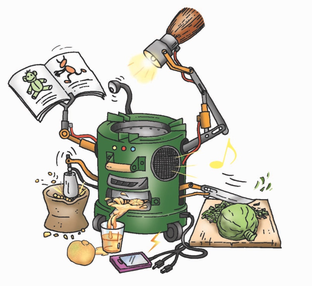The Stuff of LifeBy Mike Clifford
 The Over-Improved Stove. Source: Henderson Mawera, Illustrator, Malawi The Over-Improved Stove. Source: Henderson Mawera, Illustrator, Malawi
When I tell people outside of academia that I’m a lecturer, sometimes I get the impression that their perception of what I do is quite a long way from the lived reality. And perhaps that’s not altogether surprising, since lecturers don’t exactly spend much of their time giving lectures. I suppose we could adopt a more realistic job title, but “form-filler” or “email fire fighter” don’t carry quite the same kudos.
One of my research projects is just drawing to a close and so I have a lot of forms to fill in. My current least favourite is something called a log-frame, where I have to enter the project outputs in neat, quantifiable pigeonholes and describe the impact that the research has had. Sometimes this isn’t an easy task and, to their credit, many funding bodies are also coming to the realisation that all of the outcomes of a piece of research may not be easy to quantify. The project in question looked at the barriers to the dissemination and uptake of improved cooking stoves across sub-Saharan Africa. It’s been a rollercoaster journey and a lot of fun, with travel to exotic locations, experiencing new cultures and meeting lots of interesting characters. In particular, the project has tried to break away from the technological focus of engineering approaches to development and to ask the question “why do you cook like this?” rather than to design a bunch of “improved” stoves which might not address what users really want. One approach that has gone down well has been “The Great African Bake Off” a title adapted from a popular UK TV show: “The Great British Bake Off.” The TV show sees contestants competing to cook the best bread, cakes and patisseries, and to decorate their creations with ganache so smooth, that the demanding judges can see their reflections in the surface. In our version, rather than run a cooking competition, we wanted to explore people’s thoughts on various cooking stoves. We started in Nottingham, UK, and invited ten ladies from the Nottingham Refugee Forum to come to cook their favourite food on the stoves that I’d collected during my travels. The day was probably the most fun that I’ve had on campus during my twenty three years working here. We ended by inviting academics and representatives from the funding bodies to meet the cooks and to share food together (1). We followed up the Nottingham event with “Cook Offs” in Malawi and Zambia (2) (people tend to cook rather than bake in sub-Saharan Africa). The Zambia trip was quite an experience for many reasons. I’d visited the previous year and was happy to be back in Livingstone. Our preparations were going well, but a couple of days before the event, I collapsed and was rushed to hospital. My colleague, Charlotte stepped into the breach and as well as successfully running “The Great African Cook Off” managed to get me to hospital, rebook my flights and arrange for me to be looked after well. A major challenge for our research is to incorporate qualitative findings and stories into academic outputs and to try to understand why people choose to cook the way they do. Often, local culture and customs have a large bearing on people’s use of technologies. This can be due to availability of fuel, but often goes deeper than that as explained in the following quote from fieldwork: “When I was in the city, I bought a kerosene stove… my wife was using it to prepare food, that was the stove we were using. I also had electric iron, then we were in the city and were doing exactly what other people were doing too. However, I am in the village now and have abandoned completely these devices to be at par with people in this community. I don’t want to be live a different lifestyle, things would have been difficult for me if I had not done that.” Back to quantifying outputs and impact, the Barriers project has seen many changes of personnel and life-events for the people involved with the research. We’ve seen two weddings, two babies have been born, there’s been a divorce, one person suffered a stroke and sadly, one of our project partners died. Of course, none of this fits on to the log frame; the stuff of life is always hard to pigeonhole and all too rarely we ask what impact our research has had on ourselves. Emphasising the human side of the project and writing up our experiences through articles such as this one provides a way to let the pigeons fly. I have many happy memories from my travels, one of the most poignant being entertained by a group of bare-foot children singing a simple song: “I am a blessèd child.” That goes for me too. (1) https://mediaspace.nottingham.ac.uk/media/The+Great+African+Bake+Off/1_5zpakkfg (2) https://www.youtube.com/watch?v=M5S2ujl-57U |
Mike Clifford is an Associate Professor in the Faculty of Engineering at the University of Nottingham. His research interests are in combustion, biomass briquetting, cookstove design and other appropriate technologies. He has published over 80 refereed conference and journal publications and has contributed chapters to books on composites processing and on appropriate and sustainable technologies.
Mike was recently honored by Universitas 21 (a global network of research universities) for his efforts regarding internationalisation in education both within and beyond the engineering classroom. U21 writes that "[Mike] created international experiences for students which impact positively on communities with a particular focus on Africa, but also across the globe, including Cambodia, India, Malaysia and Tajikistan." In 2009, Mike was voted "engineering lecturer of the year" by the Higher Education Academy's Engineering Subject Centre for his innovative teaching methods involving costume, drama, poetry and storytelling. |



